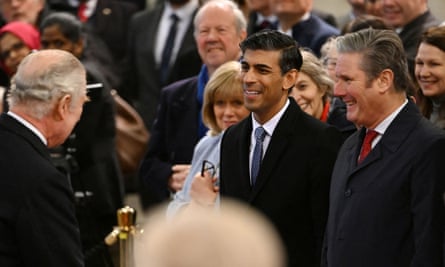Extract from The Guardian
- Katharine Murphy is Guardian Australia’s political editor

Albanese had managed to defeat Scott Morrison – a polarising antipodean echo of Trump and Boris Johnson pumped up by the Murdoch media machine – despite the Labor party recording its lowest primary vote since the 1930s.
How did he pull it off? In the run-up to May 2022, Labor felt the surest path to victory involved keeping the focus squarely on a prime minister rendered deeply unpopular by accumulated pandemic fatigue, his own character flaws and by the Liberal-National Coalition’s consistent failure to offer serious solutions to the big challenges Australia faces.
Like the Tory party in Britain, the conservative side of politics in Australia had used leadership changes over the past 10 years to tighten its grip on the government benches, fielding three leaders over three terms. Tony Abbott was so diabolically bad at being prime minister he would have struggled to win an election in 2016, but he was replaced by Malcolm Turnbull, who won the contest that year by a whisker. Turnbull – a progressive in Liberal party terms – was then ejected by the right wing of his own party and replaced by Morrison, who won the 2019 contest by styling his Coalition as an insurgent opposition challenging a Corbynite Labor government in exile.
Albanese offered voters a positive Labor alternative. An Albanese government would bring down the curtain on Australia’s version of Brexit – the decade-long climate wars that poisoned politics and polarised the country. Albanese styled himself as persuader, not polariser, in an implicit rebuke of the rampant politicking of the incumbent. He also promised to legislate a federal anti-corruption commission to bring integrity back to politics. Morrison had made voters a similar promise in 2018, but reneged. Labor would end the culture of “rorts’” – corruption – and “waste”, a pitch that had salience because of the accumulation of high-level audits excoriating the Coalition’s mismanagement of discretionary grants programmes.
So there was a Labor programme, and a big-picture pitch for reconciliation and renewal. But Albanese did not seek to dominate the national conversation with Labor’s policy offering, lest that crowd out the political reckoning brewing for Morrison. As Labor’s campaign review ultimately concluded: “Although several factors contributed to the [election] outcome, the unpopularity of Scott Morrison and his government was the most significant.”
At this point in the story, a famous quip from the late Australian media mogul Kerry Packer springs to mind. After Packer sold his commercial television network to a business rival in 1987 for just over A$1bn and then bought it back for A$250m three years later, he declared: “You only get one Alan Bond in your lifetime, and I’ve had mine.”

Albanese had Morrison – the best political foil he could have hoped for – but it is not clear that Rishi Sunak is Starmer’s Morrison. Indeed, given what I’ve witnessed here, it’s possible that a dose of Sunak – after the flamboyant impulsiveness of Johnson and the hectic incompetence of Liz Truss – delivers the required regeneration trick. I recently read a piece in the New York Times speculating that dullness could be Sunak’s secret weapon, as it has proved to be for Biden – and that the two leaders were both letting “the steam out of their countries’ hothouse politics by making a virtue of being, well, a little boring”.
But the Albanese victory suggests that piercing the right’s longevity strategy is possible, and that Starmer and British Labour do have something to learn from Albanese’s approach to taking back government after a decade of Coalition rule.
The first point to make is that Sunak is on the clock now. He won’t face voters until late 2024 or early 2025. Two years out from the contest, Morrison wasn’t yet the Morrison Albanese faced in May 2022. Morrison peaked politically in 2020, then corroded precipitously. He was convicted in the court of public opinion in the year and a half leading up to the 2022 contest. Time is not your friend in politics, particularly after a long stretch in power.
The second lesson is that Albanese and his campaign team made smart choices. One was Albanese’s early call to engage women, both with policy (a big spending childcare commitment was one of his first decisions) and significantly, with a less testosterone-charged leadership style. Albanese appeared to listen as often as he spoke. These instincts were the correct ones. The Liberal party’s post-election research shows the party failed to win a majority of female voters across all age cohorts in 2022. Only 25% of female voters aged between 18 and 34 voted Liberal on 21 May.
I suspect the British Labour party, after the failed experiment of Jeremy Corbyn, could be tempted to revert to conventional New Labour presidential styling, pitching Starmer as the next Tony Blair. Labour might believe it needs to engineer the big change moment, a sense of a charismatic prime ministerial aspirant, promulgating transformational policy, surfing a wave of manifest destiny, to have any hope of blasting the Tories out of office.
Perhaps Starmer will need to inculcate that presidential-style New Labour moment to be the next prime minister of Britain. But the lesson from Australia is perhaps he won’t – that instead, voters are open to a different kind of change moment: something quieter, something modest, something inclusive, something team-oriented, rather than presidential.
Approaching government quietly also helps after the transition. It seems to have extended the Albanese government’s honeymoon with voters. When Labor last took office in Australia, back in 2007, deploying New Labour-style razzle-dazzle in the form of the change agent Kevin Rudd, the country thrummed with hope. The zeitgeist was very different in 2022. The Albanese victory was met with relief.
That difference in the starting point matters. Rudd enjoyed stratospheric voter approval, which meant he had a long way to fall when the post-election substance fell short of the pre-election styling. Albanese will fall eventually too. Obsolescence is the way of politics.
But for now, a majority of Australian voters are enjoying seeing a new Labor prime minister prosper in the top job, perhaps surpassing some of their initial expectations about his capabilities. In Australia, as in the UK, proportionate voter expectations are a solid foundation for a progressive government that wants to command public confidence for long enough to legislate its agenda, and live to fight another day.
Katharine Murphy is Guardian Australia’s political editor, and the author of Lone Wolf, Albanese and the New Politics, published by Black Inc
Do you have an opinion on the issues raised in this article? If you would like to submit a response of up to 300 words by email to be considered for publication in our letters section, please click here.

No comments:
Post a Comment